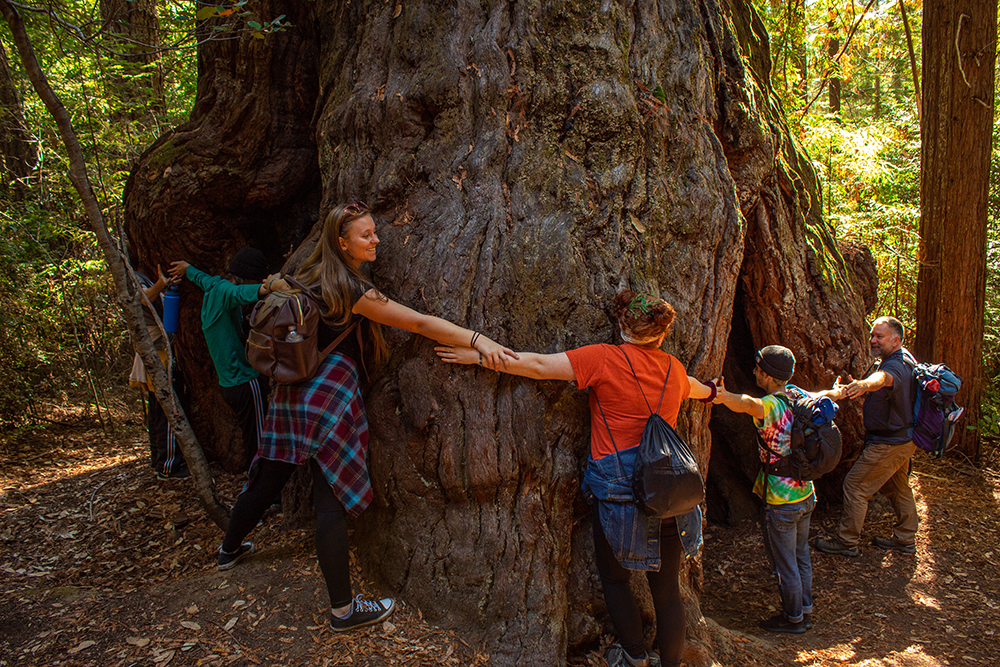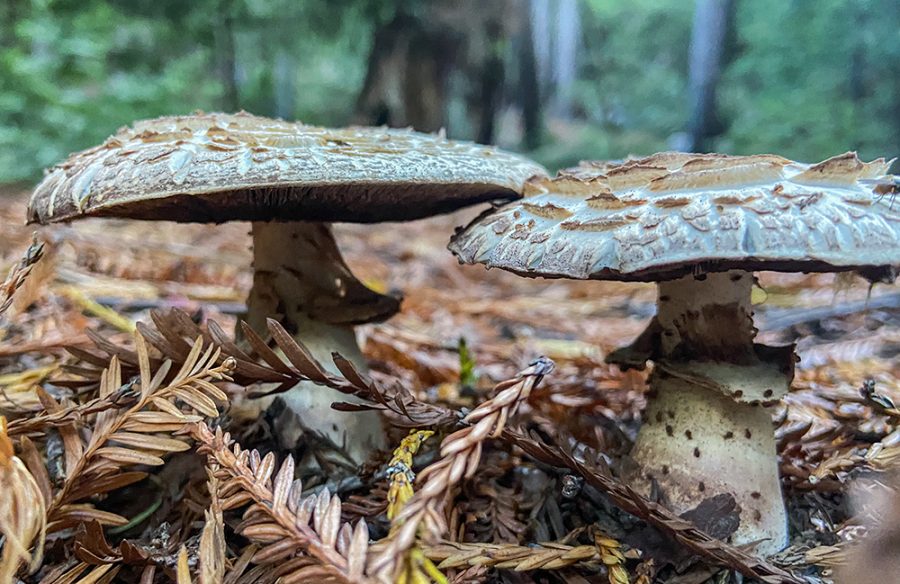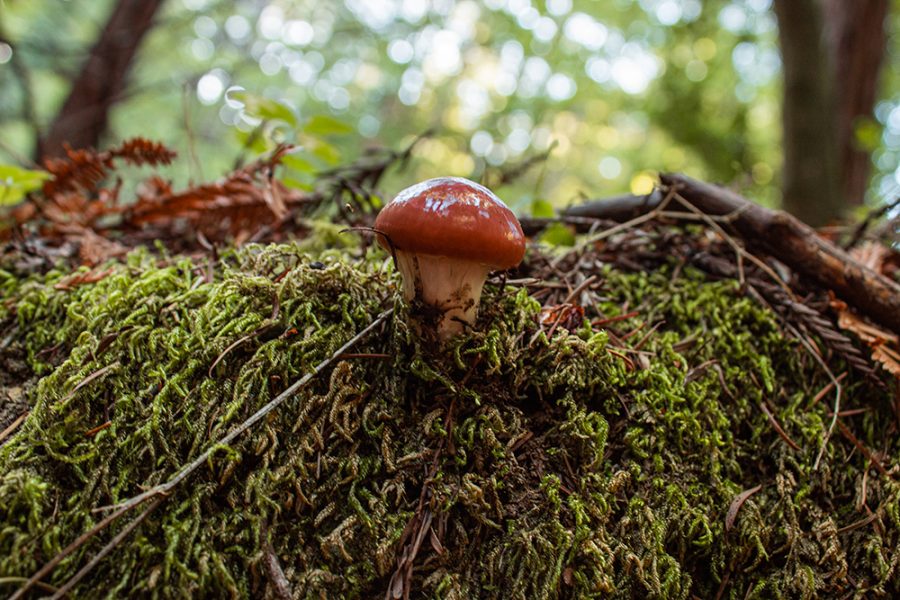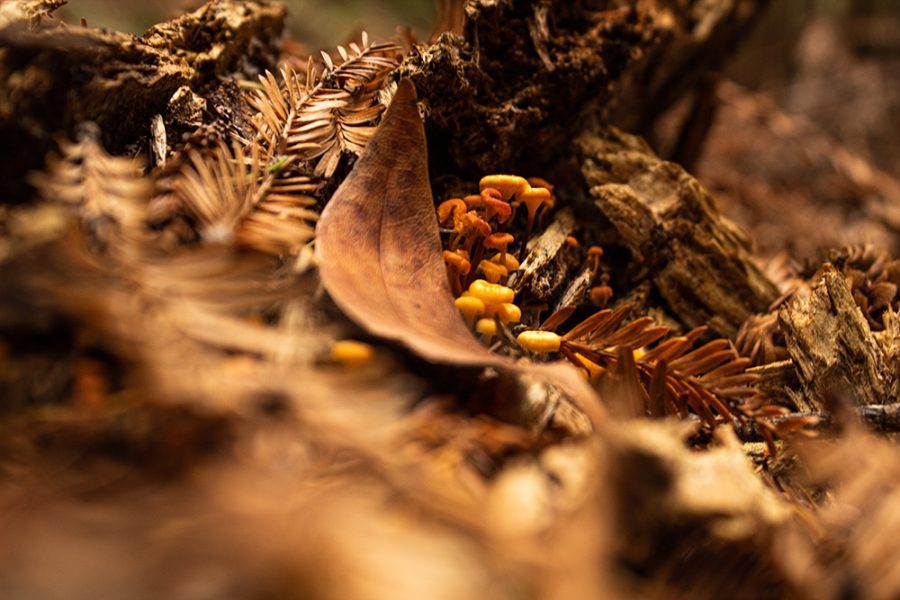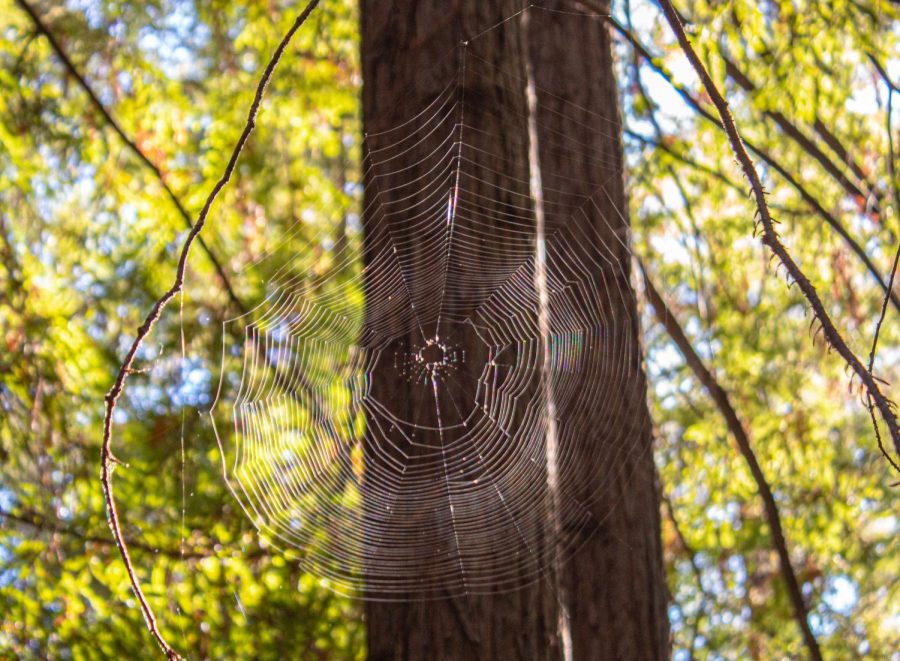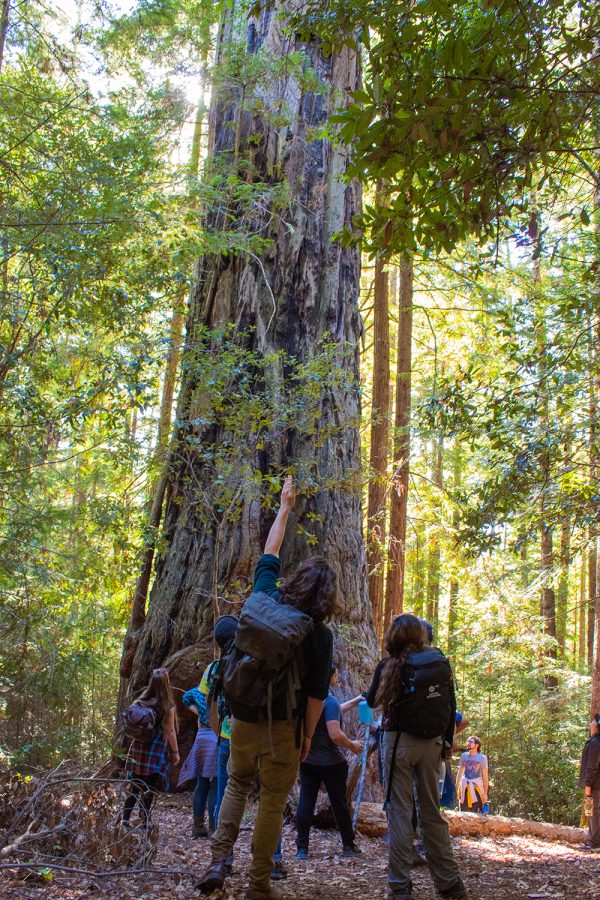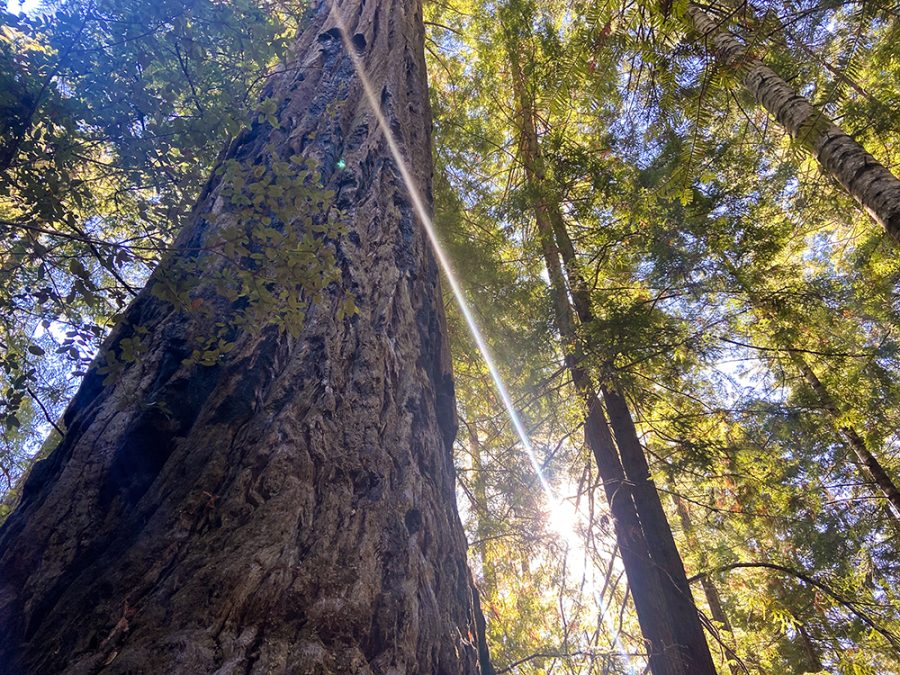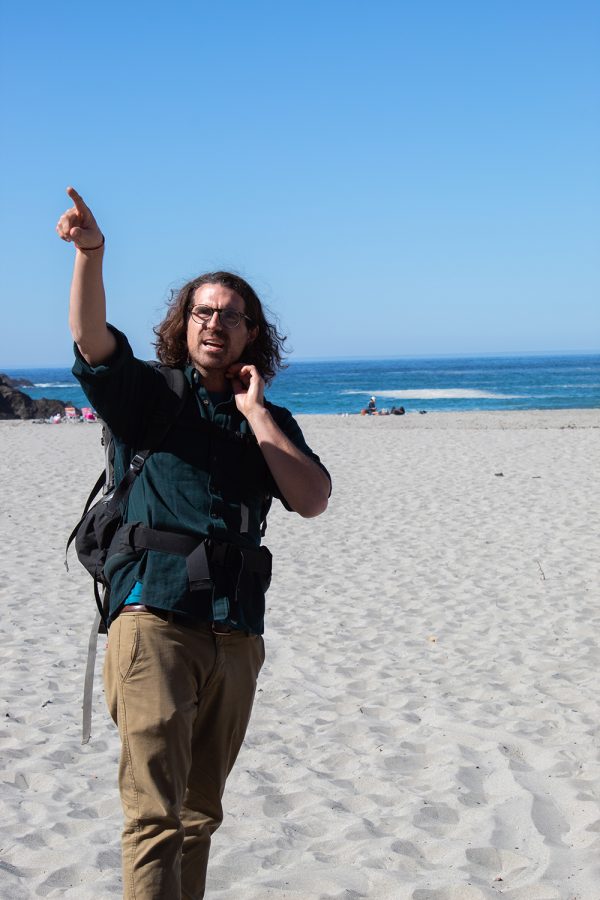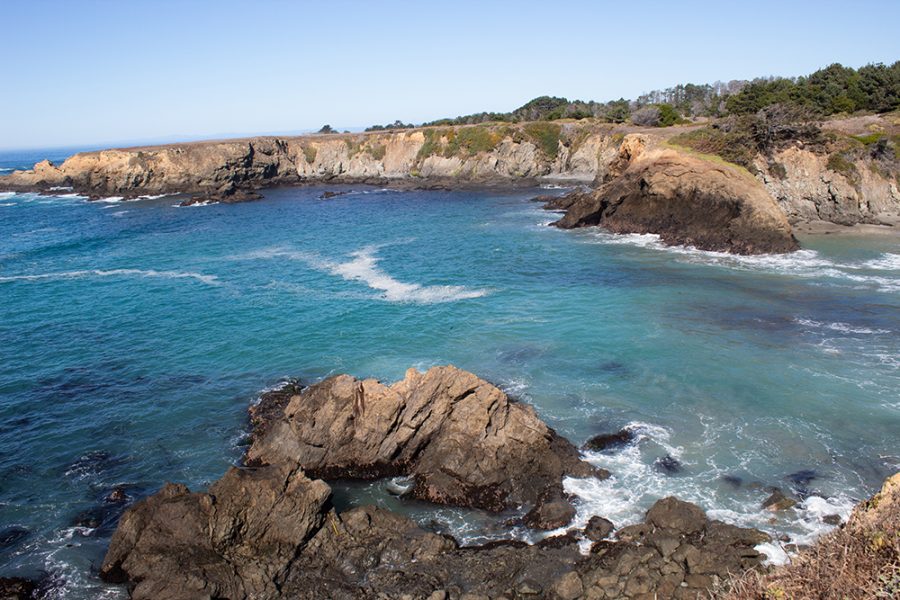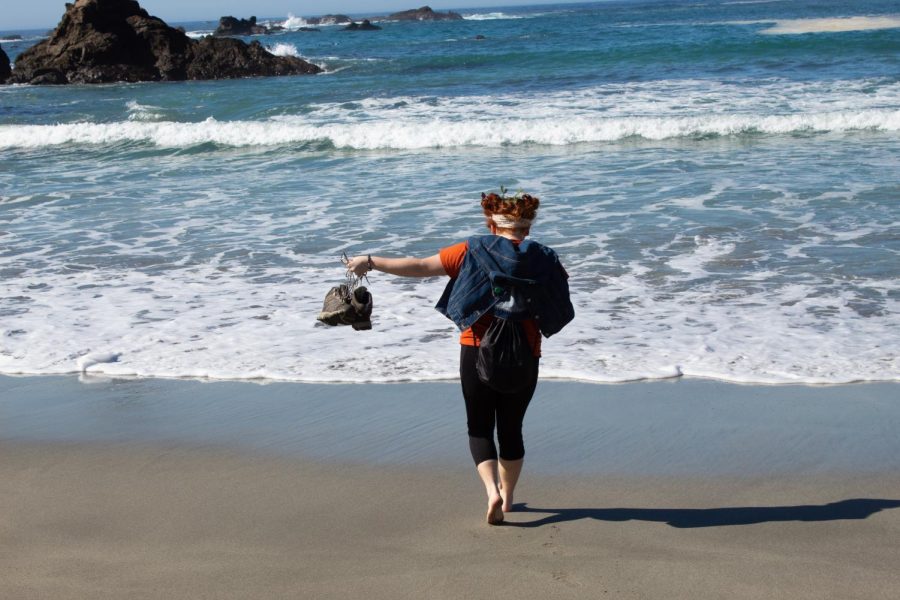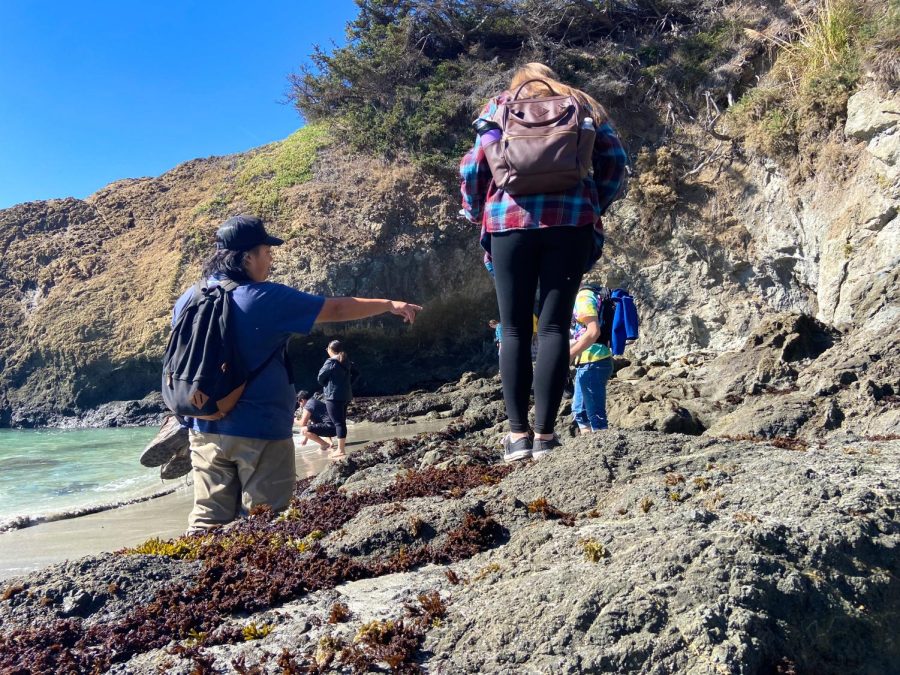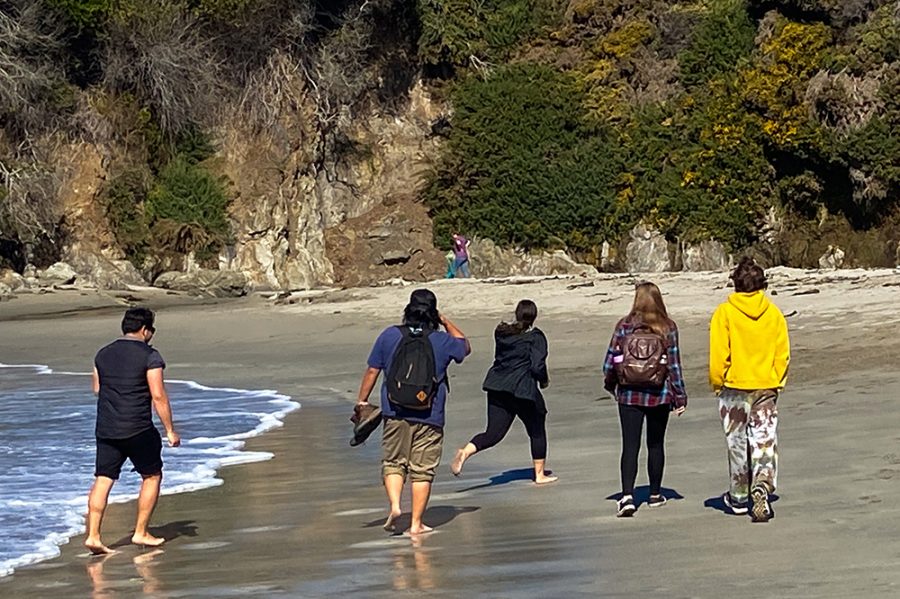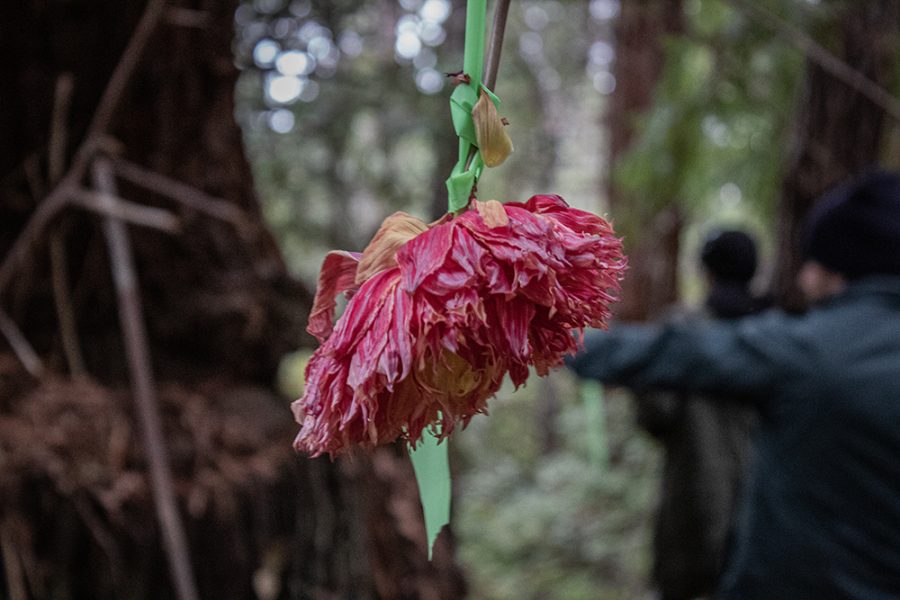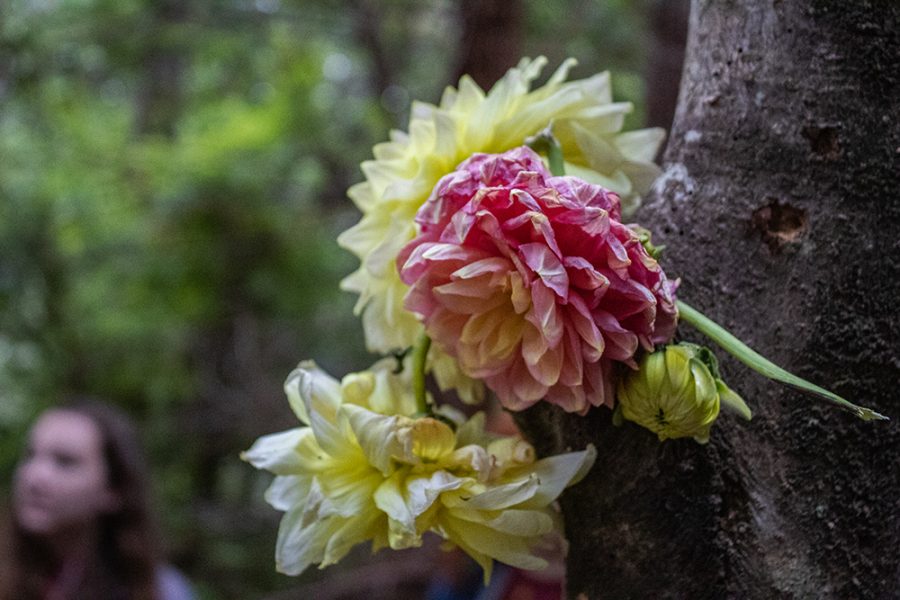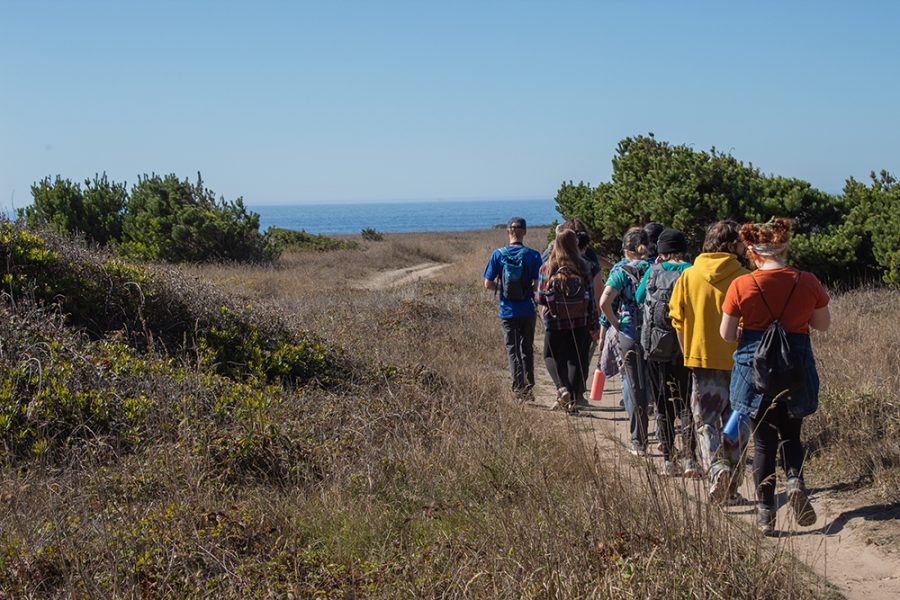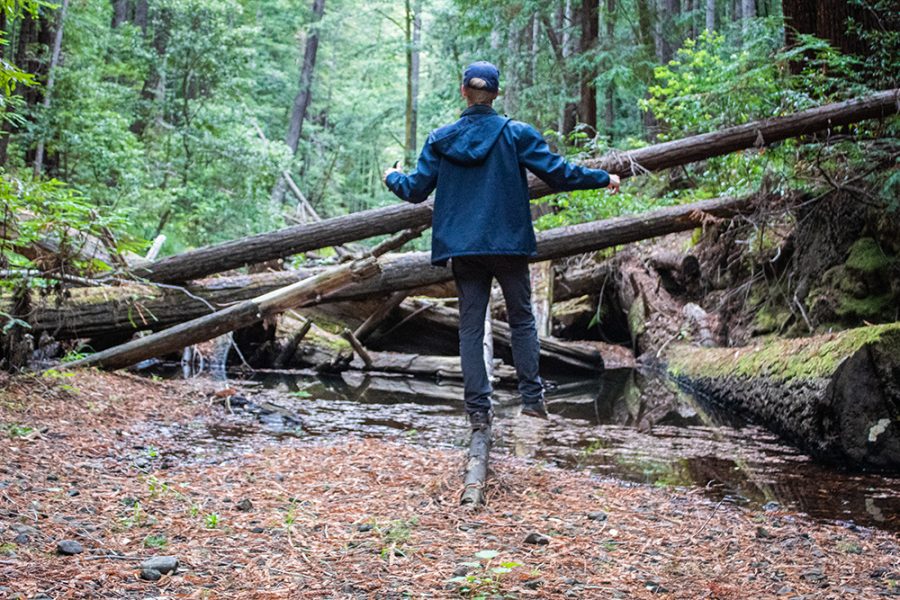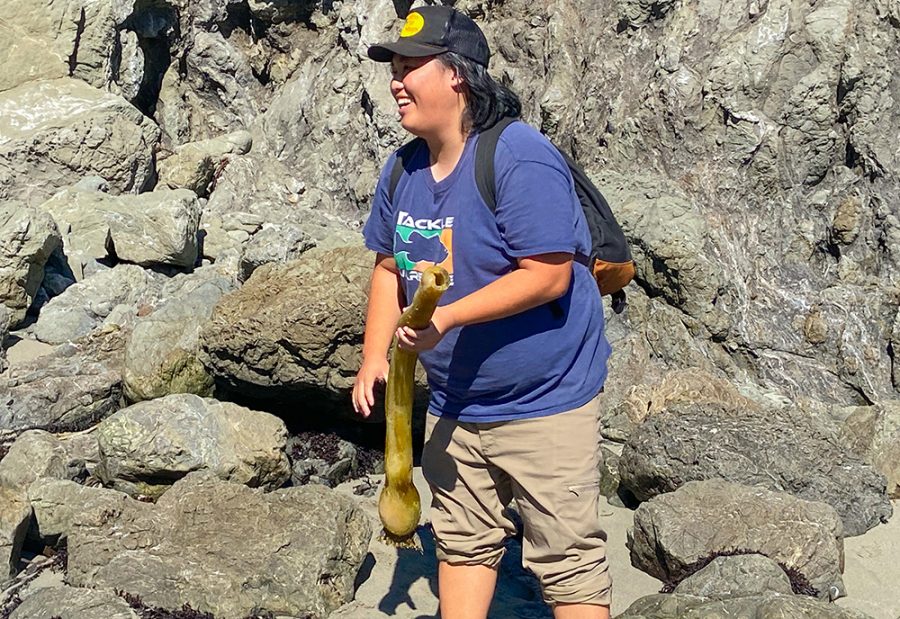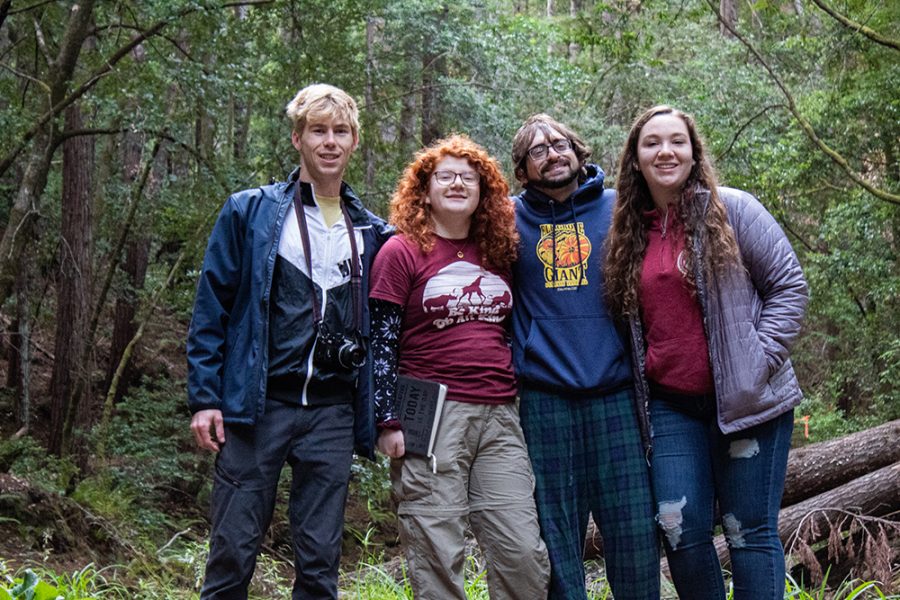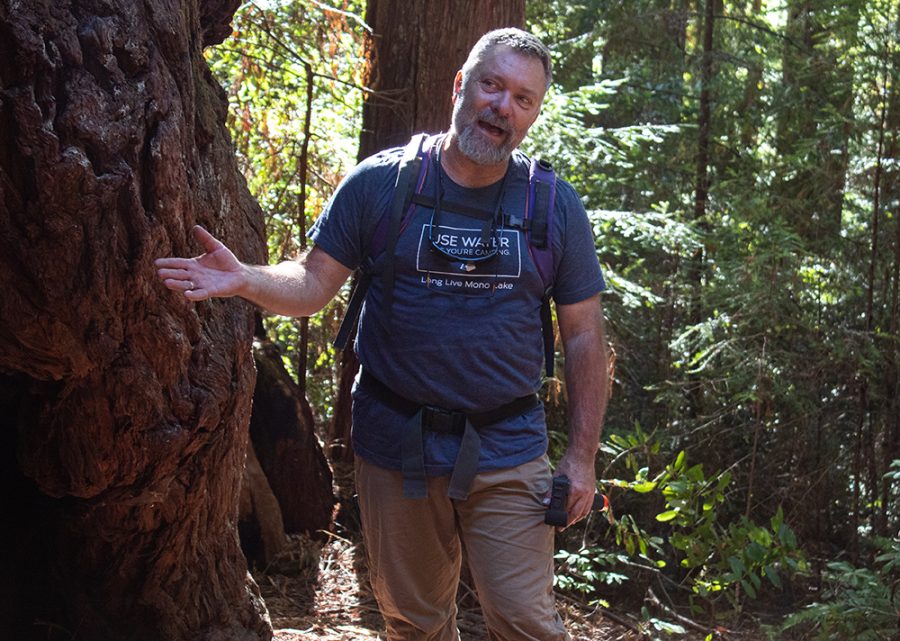Conquering anxiety amongst the redwoods
November 7, 2021
A fish out of water
crying in the dressing room of a JCPenney is not how I like to describe the start of a great adventure. However, it’s how I started mine.
I preface this embarrassing piece of information with how I have a panic disorder. Not the, “public speaking makes me anxious,” kind of anxiety, but the kind of anxiety that will hit me like a brick to the face in the middle of class because someone made eye contact with me for three seconds too long. The, “I can’t wear orange, because people will look at me, and then I’ll just have to die,” kind of anxiety.
It surprised me when I found my hands typing a request to go camping in Mendocino Woodlands State Park with Chico State Parks and Recreation Professor Jesse Engebretson and Sacramento State Professor David Rolloff, who were leading students on field study camps in California State National Parks as part of an ongoing question of what a classroom could look like.
So here I was, two months later, about to take the four-hour drive to Mendocino to join the field study camp. I was stressed, running late and stuffed like a sardine into a tiny car packed with too many things. Yet, somehow, I had forgotten things at home.
“A blue silicone fox-shaped plate from the kids section,” I had thought, “perfect!”
“Salt, sugar, or a camping chair? Not important. A massive hunting knife with a built-in fire-starter and whistle? Absolutely.”
Despite growing up in the forested mountain town of Paradise, I never had the money growing up to go camping. We grew up very poor; my mother was disabled and she and I lived off her disability checks. I took care of her and that — paired with chronic illness that put her in the hospital frequently — made camping impossible.
I’ve always loved being outside, though. A program in sixth grade called “Evergreen,” exposed me to hiking and camping in the surrounding national parks. It was like any other sixth-grade class, but it had a strong focus on getting students outdoors. We went hiking at Mt. Lassen and Feather Falls, and we spent time learning how to cultivate a garden and practice sustainability. The program ended the school year with a three-day camping trip to Whiskeytown National Recreation Area. It was incredible, and the experience cemented my love of the outdoors.
That same little kid-brained part of me jumped for joy at the thought of camping among the redwoods.
An Orion reporter lost in the woods
The drive to Mendocino started off a little rocky. I can’t drive, and my wonderfully kind partner Jon had volunteered to chauffeur me the four-hour drive to the campsite from Chico. Infinitely patient, he is the kind of man to give you the shirt off his back if you were cold. Tall and goofy with a mess of black curly hair, he looks the part too.
That day, even he was a little frazzled.
We were to be at the site at 2 p.m. Friday Oct. 15, but we couldn’t get out of Chico that day until 11 a.m. I forgot bags, breakfast and made us stop for endless bathroom breaks. Throughout it all, Jon put up with me and my endless question of, “It will be fine, right?”
The drive was gorgeous, once we got past the dried out drought ridden region of NorCal. We drove through the small town of Clear Lake, aptly named for the massive lake to the left of the town and then through the beautiful tree-lined Highway 20 down through the mountains to Fort Bragg.
I don’t know when fear became excitement, but it was somewhere around the first sightings of the redwoods in hour four of the drive. The world had been hot and dry leaving the city, but as we got closer to the ocean, the sun became muted and warm, light floating in the now cool moisture of the air.
The ocean arose suddenly on our right, a sheet of emerald blue green water stretching far off into the distance. I’ve only ever seen the ocean twice in my life, and it took my breath away.
We turned left, away from the cliff faces and the water, and began to descend.
Mendocino Woodlands Camp lay within a valley of redwoods. It was miles down winding dirt roads with sheer drops along one side and surrounded by massive trees with dense green ferns crowding the ground.
The roads wound down in tight curves, snaking down the valleys of Fort Bragg. It felt like we had descended even below the elevation of the ocean
The deeper we got into the valley, the taller the trees grew. Mountainous things, like giants. The trees grew taller and taller until our little black car was dwarfed by the size of them and the shadows grew longer.
While I sat in absolute awe of the place we had found ourselves in, Jon sat with gritted teeth and white knuckles as he tried to keep us on the tiny narrow road. I imagine the sight of his pinched anxiety-ridden face and my smushed face of childlike wonder pressed against the window would have been hilarious to see.
Our camp was the last one in the forest, and I do mean the last one. We finally made it to the ranger station after miles of “You’re almost there!” signs mocking us, only to find that we had many more miles to go.
Jon and I jeered at each subsequent sign that we passed.
It was well after 3 p.m. when we finally made it to camp, but with the trees blotting out the light, it felt like late evening. What I had expected to maybe be a little clearing with room for tents and maybe a port-a-potty — if we were lucky — turned into something very different.
What greeted us was a summer camp ripped right out of a ’90s movie. Quaint little cabins with stone patios dotted the forest, joined by a little infirmary, oldschool off-white canvas tents for storage and a bathhouse. In the heart of it all was the lodge, a beautiful building with two massive stone fireplaces and a full restaurant-style kitchen.
In the rocky clearing in front of the Lodge was a group of five students, David Rolloff, Jesse Engebretson and a man I didn’t know.
Stepping out of the car, the last bit of my anxiety was washed away as I met some of the people with whom I was to spend the rest of the trip. David and Jesse were there to greet us and show us where everything was.
The whole camp was made of the same redwood as the trees surrounding us, and the buildings seemed to nestle perfectly in the little valley. I was told by David later on that the camp had been built in the ’30s, and it showed in the best way.
The smell was incredible, like the incense I sometimes burn when I feel fancy. The air was damp and cold and smelled of green leaves.
“Do you know what to do if you see a bear in the woods?” David asked us before we ventured out. “Look at it! They’re beautiful creatures. Take a photo.”
I don’t know why I was so shocked by how nice they were, but I was. It had been my anxiety talking when I assumed that they would be standoffish, and would find me weird for tagging along when I was not part of the class or major.
The students were mostly recreation, hospitality, and parks management majors here to understand how parks are managed and how they tie into conservation efforts. In total, there were 15 students including myself. Two students were from Sacramento State, the rest were from Chico State. All coming from very different walks of life and with very different personalities.
Even so, everyone was so kind, taking me around the site and showing me the different buildings. We looked at creepy stone basements, the moss-encrusted wood of the gate house and the large mushroom circle that surrounded the outer ring of the camp.
The lodge was large but very cozy, with tall vaulted ceilings and dark redwood beams. Two massive stone fireplaces stood at either end of the room, big enough for me to walk inside only slightly hunched over. Tall antique windows covered every wall and broke up the deep wood interior. Two swinging doors led to the large commercial kitchen, all shiny metal and vintage tile. A massive walk-in freezer, nearly the size of a bedroom, and an even bigger storage room took up the back two corners of the room. Windows filled every empty space of the wall.
I felt like a character in a movie, I could even hear the strumming guitar of an adventurous indie song in the background.
While we waited for the late arrivals to find their way to the camp, we had an informal talk around the small stone patio of the lodge.
We met Chad Swimmer, the unknown man in the clearing. He sat on the ground next to a very fancy looking mountain bike. It lay on the ground in stark contrast to Chad. He was in well-worn earth toned clothing and shorts, despite the cold. He lounged on the ground in front of the lodge as if he had spent all his life there.
Chad is a member of the Mendocino Train Stewards. Jesse and David contacted him to speak with us about the forest we were in and the human aspect of conservation.
David called us over, and we stood around the side of the lodge, the light falling in dim beams and deep blue shadows that grew while Chad spoke. The air was heavy with moisture and a settled silence.
He taught us about the sequestering of carbon in redwood trees and the underground network of mushrooms that link the trees and contribute to their survival. He spoke about the mental health benefits of trees and the fiscal impact of ecotourism.
“Our society is built on the idea of economic worth,” Chad said. “These trees are worth more standing.”
This kind of conversation and informal teaching set the stage for the rest of the trip. It was learning for the sake of learning, and it was wonderful.
After the talk, we were left to our own devices for the evening before dinner and our official group meeting. We all went to explore our campsite together.
Tucked a couple hundred feet from the lodge was a hollowed-out redwood stump. It was taller than all of us and 10 times as wide. We jokingly began to climb inside one after another to see how many of us would fit. All 11 of us did.
It was calm and quiet. We all sat around in the tree and began to talk about our favorite childhood TV shows, the best horror movies and why we chose our majors. In that time we were not so different anymore, and it was easy to bridge the wide gaps separating us.
It was of no surprise that we all decided to stay in the main room of the lodge together for the remainder of the trip. We could’ve all chosen individual cabins around the site to stay in, but it was a little spooky as night set in, and I think we all just felt a little more comfortable together.
One of us offhandedly joked about building forts with the piles of camping mattresses tucked against the far wall of the room and the idea stuck. It was ridiculous — a bunch of 20-somethings building a lodge-sized pillow fort to sleep in. It broke the last bit of ice between us.
David and Jesse let us have our fun as we made little sleeping nooks and double-decker fort beds. We brought piles of mattresses down on top of each other and made a mess of everything, but it was the most fun I’ve had in a long time.
Seeing Jesse nervously stand in a corner suggesting COVID safety measures, like keeping the giant kitchen vent on through the night and divider walls for the forts, as we all continued on merrily was also a highlight.
We all made our dinners after that with some relief at having such a nice kitchen to cook in. Later we had a short meeting to talk about our plans for the trip and then we went outside to sit around the campfire and talk before bed.
In the small clearing outside the lodge, there was a little patch of unobstructed night sky above us where we sat. The deep blue shadows of the forest gave way to the roaring fire that the professors built to keep warm against the chill. We sat for a long time and talked about the forest and the purpose of our trip.
Sleeping that night was difficult, and I tossed and turned for a long time. My little fort proved to be incredibly cozy and warm though, being right next to the gently crackling fireplace. My excitement for the day to come kept me awake long after the fire grew dim. I wasn’t sure exactly what our plans were yet, mainly hiking and “class,” but I was ready for anything. I fell asleep to the last rustling embers of the fire settling in for the night.
Big Tree
The next day we began our field study camp in earnest.
Long before anyone else was awake, Jennifer and Eduardo got up, showered and cooked themselves a healthy breakfast. They were the power couple of the group. The kind of people that just looked perfect and made it look effortless, even after spending a night on the floor of a dusty lodge.
I, however, crept around the beautiful campsite that morning like a gremlin, hunched over and grumbling about the early hour. In my panic-packing the night before the trip, I had forgotten the most essential and vital thing for any trip: coffee.
Vincent, a kind man with glasses and a short beard, saw my sorry state and came to my rescue with a packet of instant Vietnamese coffee. I’ve had a lot of coffee in my life, but that has to be one of the best cups ever. Once again, I was human.
To start the day, Esme Plascencia, leader of Latino Outdoors in Mendocino County, led us on, what she called, a warmup hike. Our destination was Big Tree.
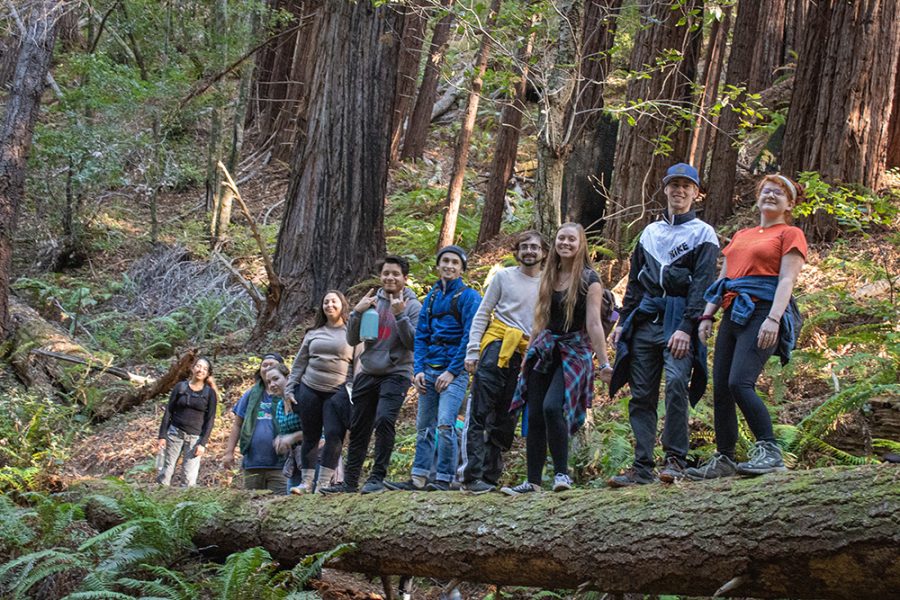
“It’s only about a mile!” She claimed.
It was not a mile.
This was to be a running joke for the rest of the weekend. The trail, in all actuality, ended up being about three miles, completely uphill. She neglected to mention that. I don’t mean a little incline kind of incline. I mean we walked up 48 flights of stairs kind of incline.
So says Jessica, whose tracker logged our steps. She is a short, fairy-like, woman with a shock of curly red hair that somehow became filled with flowers and leaves throughout the day. She seemed to have no trouble at all during the hike, chipper as always at the front of the pack while we all dragged ourselves up the steep hills behind her. Her leaf crown was in perfect condition throughout it all.
Along the way I think I saw God, who told me that I really should have brought my inhaler.
At the top of the vista there was suddenly a break in the trees, and we saw it. Settled in a beautifully lit clearing, the sun broke through the dense, dark forest. It was Big Tree.
The behemoth was hundreds of feet tall, dwarfing the others; it took all 15 of us, arm to arm, to surround the diameter of the trunk.
Hugging that tree, all of us together, created a perfect silence. Seeing this thing, over 1,300 years old, we all felt humble. This tree had been here before the ancestors of my ancestors, and it would hopefully be here long after me.
“Bunch of tree-hugging hippies!” David shouted from somewhere behind the giant tree.
All of us came away laughing, the spell broken. As we pulled away though, I caught David wiping his eyes, laughing along with us.
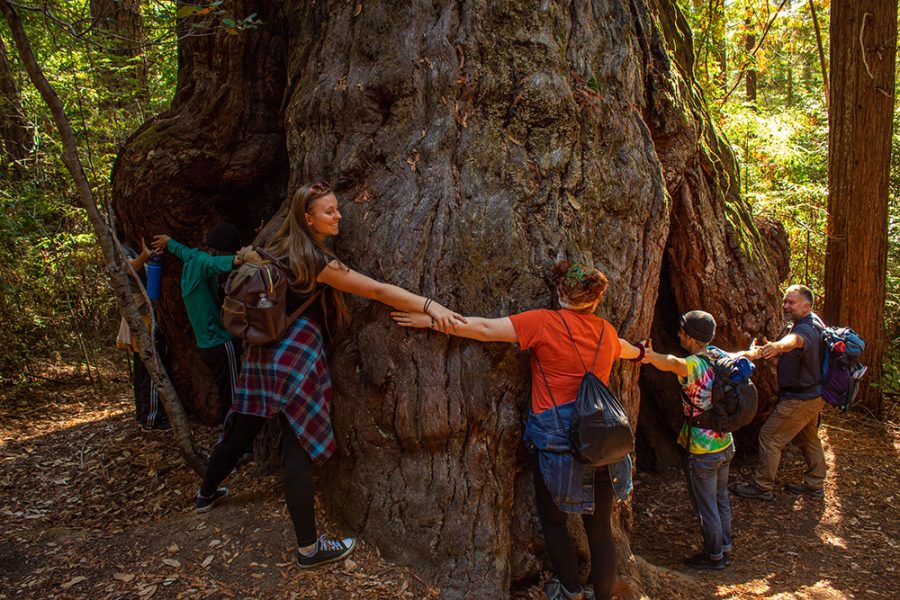
In that clearing, David and Jesse led us on another discussion about forestry and the human impacts of logging and carbon sequestration. David spoke about the Native tribes, the ecotourism industry and so many other things. It was amazing, sitting around that tree and smelling the forest and feeling the warm sun start to defrost the air.
It was like no class I’ve ever been to in my life.
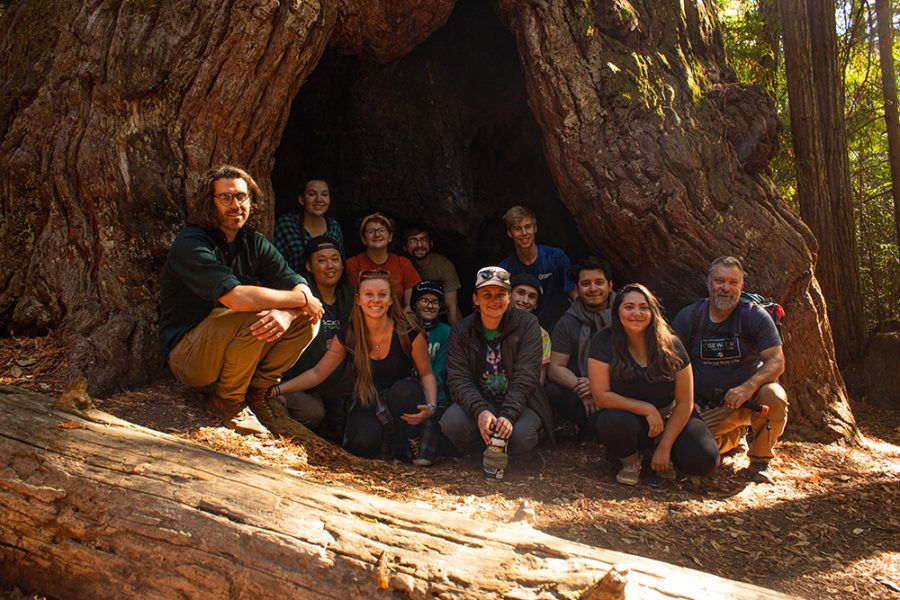
Before we knew it, the professors called it a wrap and we hiked back to the trailhead. It was a bittersweet feeling leaving that beautiful place.
We had lunch by the beach before we began our next hike through the steps of the Ecological Staircase trail. We all sat together and wolfed down food, most likely to the horror of other passing hikers, while Jesse showed us baby pictures of his kids.
The hike was a bit chaotic, as the area was not managed well and we kept getting lost. Signs were buried in overgrown greenery, pointing unhelpfully this and that way with no conceivable rhyme or reason. Occasionally Jesse could be heard at the back of the party bemoaning the sorry state of the trails.
We finally took a small detour at the beach to talk about dog monitoring and to play in the sand and water. The midday sun shone brightly against the reflective sand as we exited the tree canopy. The sky was an endless clear blue above and the air was cool and damp, smelling of sea salt and leaves.
I felt like a kid again: causing trouble for the adults and being way too loud with friends. David and Jesse stood stalwart as we went exploring, guarding our shoes and bags and making sure we didn’t cause too much trouble.
After clearing the sand off our feet, we continued on.
Walking around the cliffs surrounding the ocean (only about a mile hike, David told us), we saw vastly different ecoregions with each step of the Ecological Staircase. One moment, we were walking through a lush forest with mushrooms and pine trees and the next we were surrounded by the expansive gray spider-like roots of a tree, which seemed to encompass an entire clearing like a web. It would have been dizzying had it not been so incredible to behold.
We talked about trail management as we walked and the impact of hikers on native vegetation. Jesse spoke about invasive succulents and their importance to the foundation of the cliffs we stood on. It was, somehow, both a running conversation and an in-depth lecture.
That night we made dinner together, utilizing the massive kitchen in the lodge. After the day we had, we didn’t need to assign tasks or cleaning chores. We worked as a team, and the food came out incredible: fresh guacamole, red rice and chicken and steak tacos with warm tortillas and salsa.

I ended up being more of a hindrance than help, so I stood back and tried not to get in anyone’s way as I took sniper photos of students sneaking chips and bites of guacamole when they thought no one was looking. When I shared one with the others, we all ended up cry-laughing, bracing the kitchen counters for support.
We made smores after dinner and I finally got to use that big scary knife to carve sticks with Vincent for roasting marshmallows. David and Jesse gave advice about working as park rangers and peace police and how to find opportunities in the field.
The fire kept most of the damp chill away as we huddled together. Gooey smores covered all of our fingers and chocolate smeared our mouths. We were a mess; sweaty from the day and continuously setting our marshmallows on fire.
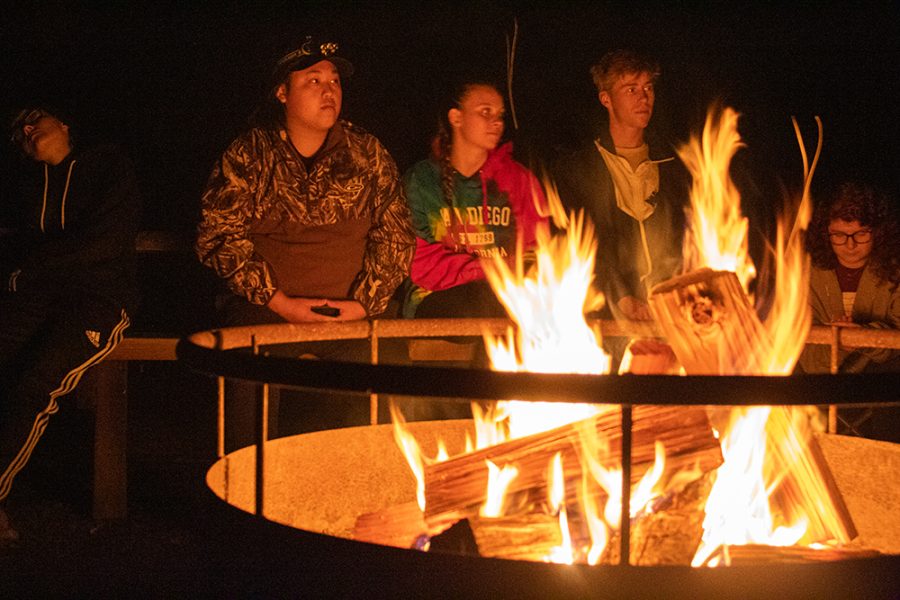
In those moments, I had to sit back and take a long look at these people I had spent so much and so little time with, but might never see again. I was so happy to have known them. Even for just a little bit.
The Mother Tree protest
The next day, we spent a quiet morning packing and cleaning up the campsite before one final outing.
“Leave no trace,” Jesse told us.
There was a quiet stillness in the air, the birds silent and the air charged with an approaching storm. A few of us took one final walk around the camp before we left, hesitant to say goodbye to it just yet.
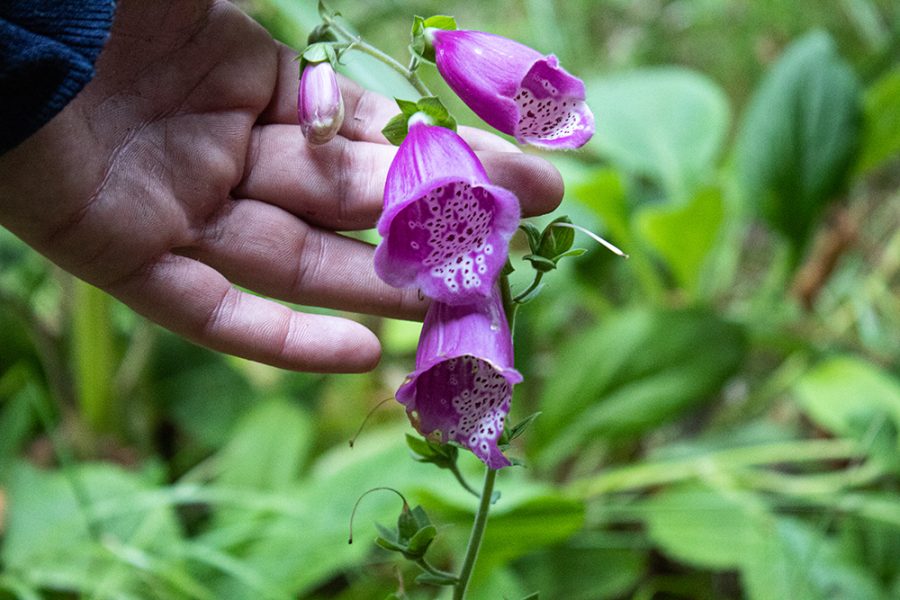
Finally, we left camp for the last time to meet up with Chad Swimmer to see a tree sit.
We went by car and got very lost. I was a little nervous that we wouldn’t be able to figure out the route as Tony, the guy I carpooled with, bounced over rocky dirt roads and massive tree-trunk speed bumps in his tiny car. Thankfully, we did eventually make it, mostly unscathed.
None of us really knew what to expect from a tree sit.
We walked through the beautiful trails of Jackson Forest, surrounded on all sides by vibrant green foliage that looked almost like hedges. Little mushrooms peeked out from the shadows.
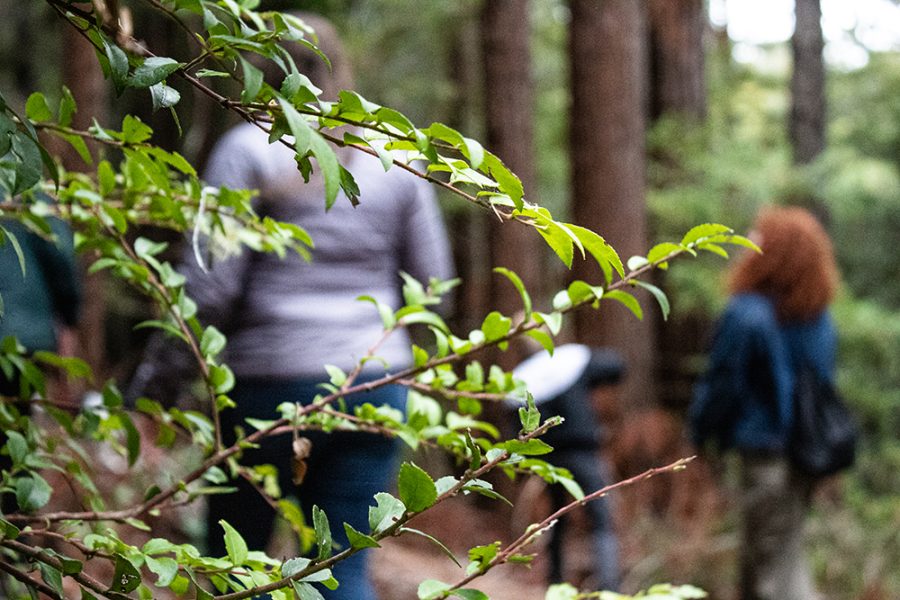
As we walked (“Only about a mile!” William called out.), Chad taught us about the native mushrooms and the logging industry that threatened the forest’s ecosystem.
We began to see trees spray painted a haphazard blue, the earth around them yellow and bulldozed. Going in deeper, we saw brightly colored carnations that led us off the ruined path. The flowers hung suspended by neon green tags near a tree where a 16-year old named Sorrel sat suspended.
Sorrel sat in protest. She sat for three days on a platform 65 feet in the air and no bigger than 200 feet in diameter. Before her, a 12-year-old boy had sat, and a 65-year-old woman would take Sorrel’s place later in the day.
A clear line has been cut into the massive tree Sorrel guarded, an obvious attempt to cut the thing down.
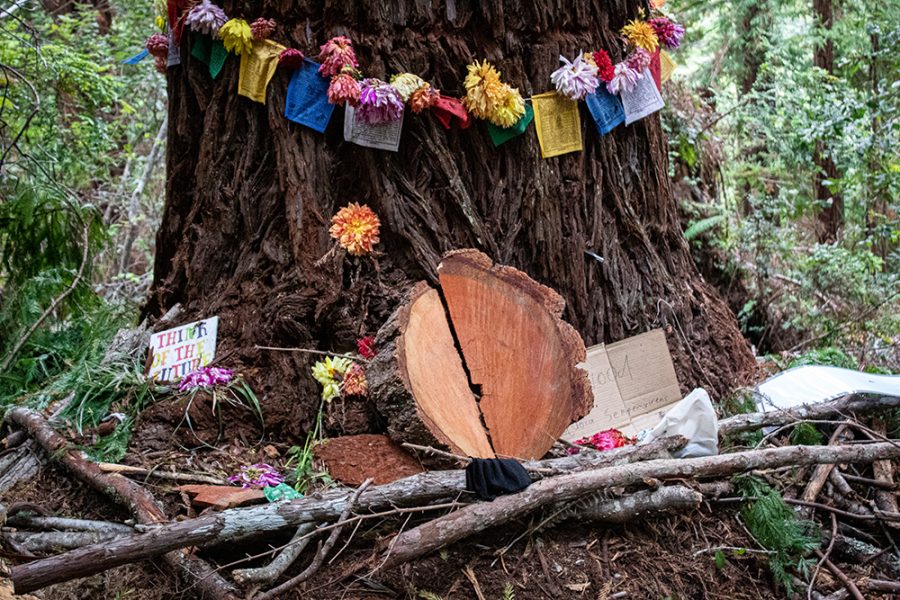
Her mother sat at the base of the tree, next to a beautiful shrine to the forest. Multi-colored carnations filled the area and surrounded the massive tree along with signs calling for protection of Jackson State Forest.
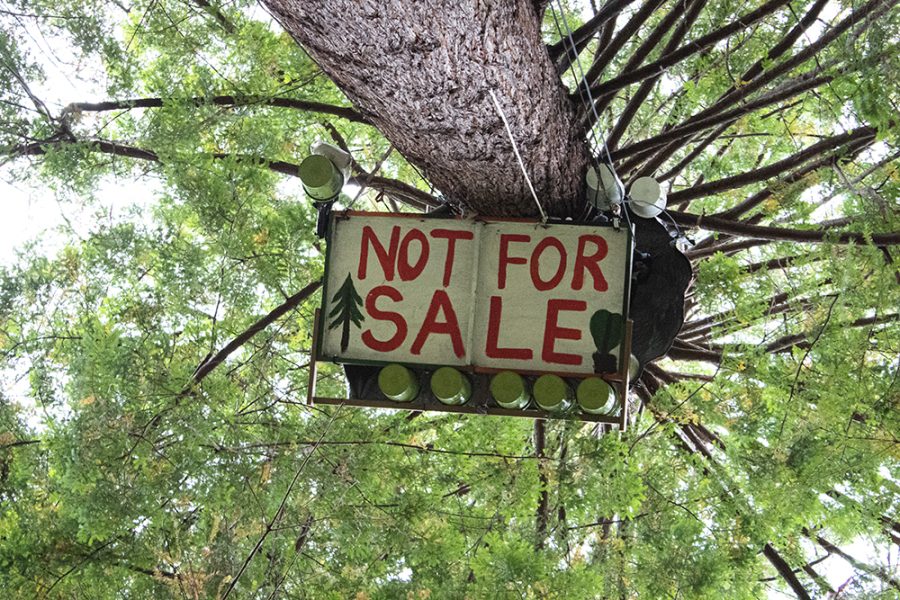
Chad led a lecture while we all sat on a massive bridge of logged redwoods nearby, the forest canopy above them destroyed and letting in harsh light. He talked about the history of the forest and the logging industry in Fort Bragg. We learned about the Coyote Valley Band of the Pomo tribe and their attempts to protest the logging of the trees in partnership with The Mendocino Trail Stewards.
As we left the forest, there was a little bit of sadness. We were all eager to get some water and return to populated society again, but leaving wasn’t easy. We all met in a giant messy group hug and then began to go our separate ways, calling out goodbyes to one another for as long as we could.
The rain began falling as we all drove away.
AUTHOR’S REFLECTION
I realized after retelling the many anecdotes and funny stories from the trip that I had not been anxious once. I had not one panic attack. Sure, I was initially a little afraid that I might get axe-murdered, but nothing like the anxiety that sits with me now as I write this. I had just been so happy to be there and experience this amazing thing that the professors put together for these students.
With everything we did throughout the trip, the professors were able to tie it back to what the students were learning. They used our communal experiences as tools to explain, in real-time, the applications of what they were trying to teach us.
It was a little bit chaotic and at times a little bit disorganized, as we were the guinea pigs for this experiment, David told us excitedly.
Even so, it was really exciting and fun.
It was evident in everything we did on the trip that Jesse and David just wanted us to be able to experience something amazing and to find unexpected friends in each other. To learn something important.
I think they succeeded.
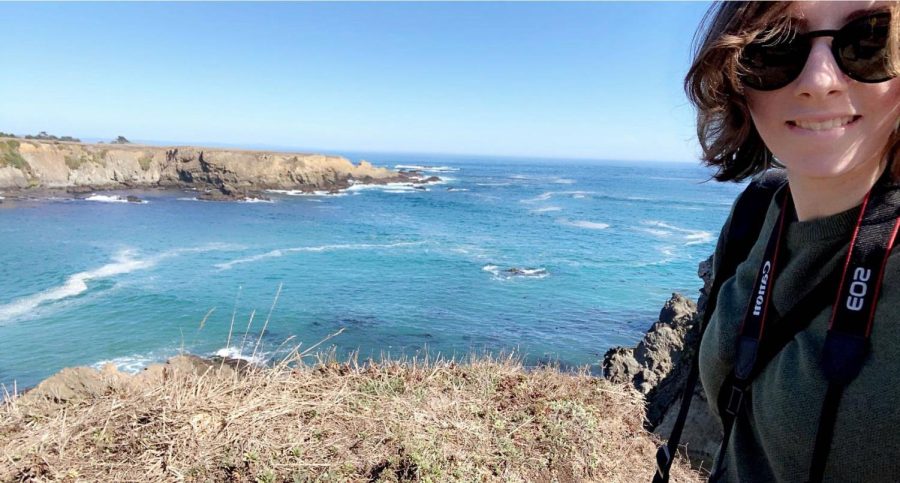
Ava Norgrove can be reached at [email protected]

